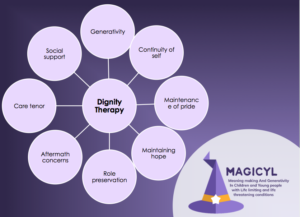MAGICYL is a research project focusing on dignity therapy and meaning-making activities for children and young people with life limiting conditions.
The MAGICYL team came together through a shared passion that the dignity of every individual across care settings and the lifespan is central and a core value to care delivery. Dignity is fostered when the individuals’ physical, emotional and spiritual needs are understood, valued and met (McSherry, 2010). In the context of life limiting / threatening conditions, there is often an assumption that as the illness progresses and there is an increased dependence on others, dignity, or sense of dignity can be lost.
Dignity Therapy
Dignity Therapy (DT) is a brief psycho therapeutic intervention that assists individuals with shortened life expectancies to see that they have meaning and purpose (Chochinov, 2012). DT was developed following the construction of the Dignity Conserving Model of Care (DCMC). The DCMC was developed from exploring interviews with individuals with advanced cancer to identify what constitutes dignity and how it can be achieved or maintained through experiences, cares and interactions for this population (Chochinov, 2002). During DT, trained professionalsencourage patients to think about and discuss their most valued memories and share their future hopes. A generativity (or legacy) document is co-developed from the patient’s narrative and this can be shared with others of the patient’s choosing, prior to or post their death. DT is becoming established in adult settings, with research supporting its effectiveness for individuals with cancer and other conditions in end of life care and earlier in their palliative care journey (Rodriguez et al, 2018).
Dignity Therapy and meaning making activates in children and young people (CYP)
A recent review by two members of the MAGICYL team found only four studies that explored DT and related meaning making interventions with young people: one focused on young people (7-17 years), the other three included young people but mean ages were 50-70. DT and related meaning making interventions can improve wellbeing, and support families but needto be developed and evaluated to ensure they meet the needs of CYP and their families. Our young people and professional engagement activities to date have identified that a DT type intervention would be welcomed. Meaning making and generativity – doing activities that will encourage a sense of meaning and purpose and that person to be remembered are essential for CYP & families but professionals are uneasy about implementation in practice.





